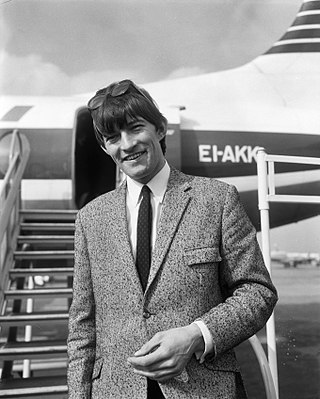
Dave Berry is an English rock singer and former teen idol during the 1960s. His best-remembered hits are "Memphis, Tennessee", "The Crying Game" (1964) and his 1965 hit "Little Things", a cover version of Bobby Goldsboro's Stateside top 40 success.
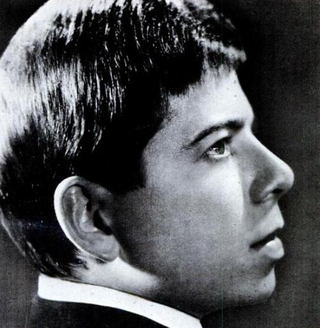
Robert Charles Goldsboro is an American pop and country singer and songwriter. He had a string of pop and country hits in the 1960s and 1970s, including his signature No. 1 hit "Honey", which sold over 1 million copies in the United States, and the UK top-10 single "Summer ".
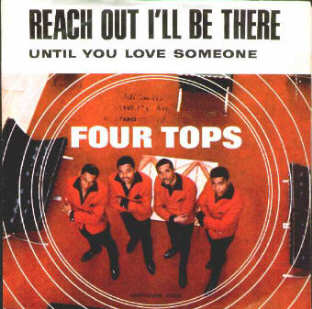
"Reach Out I'll Be There" (also formatted as "Reach Out (I'll Be There)") is a song recorded by American vocal quartet Four Tops from their fourth studio album, Reach Out (1967). Written and produced by Motown's main production team, Holland–Dozier–Holland, the song is one of the most widely-known Motown hits of the 1960s and is today considered the Four Tops' signature song.

"Sugar, Sugar" is a song written by Jeff Barry and Andy Kim, produced by Barry and recorded by The Archies, a fictional bubblegum pop band from Archie Comics. It was released as the group's third single on the Calendar Records label on May 24, 1969, rereleased on the Kirshner Records label in July 1969, and included on their second album, Everything's Archie. In the autumn of 1969, it topped both Billboard's Hot 100 and the UK Singles Chart, ranking number one for the year in both America and the UK. It is the most successful bubblegum pop single of all time, and is widely regarded as the apotheosis of the late-1960s/early-1970s bubblegum music genre. In mid-1970, R&B/soul singer Wilson Pickett achieved success on both the US soul and pop charts with a cover version.
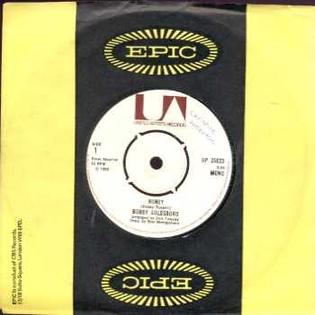
"Honey", also known as "Honey (I Miss You)", is a song written by Bobby Russell. He first produced it with former Kingston Trio member Bob Shane, who was the first to release the song. It was then given to American singer Bobby Goldsboro, who recorded it for his 1968 album of the same name, originally titled Pledge of Love. Goldsboro's version was a hit, reaching No. 1 in several countries.

"Talking in Your Sleep" is a song by American rock band the Romantics. Released in September 1983, It became the band's most successful single in the US, reaching No. 3 on the Billboard Hot 100 in early 1984. The song would have a release two months later in Australia and New Zealand, a release later that year in Japan, and in January 1984 in the UK. It failed to chart in both countries. It became a UK hit in August that year for British group Bucks Fizz. The song is in natural minor.
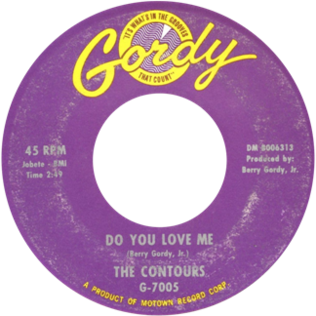
"Do You Love Me" is a rhythm and blues song recorded by the Contours in 1962. Written and produced by Motown Records owner Berry Gordy Jr., it appeared twice on the Billboard Hot 100 chart, reaching numbers three in 1962 and eleven in 1988.

"The Crying Game" is a song written by Geoff Stephens. It was first released by English rock singer Dave Berry in July 1964, becoming his first top-ten hit in the UK.

"Tired of Waiting for You" is a song by the English rock band the Kinks. It was released as a single on 15 January 1965 in the UK and on 17 February 1965 in the US. The single reached number one in the UK and number six in the US. It then appeared on their second studio album, Kinda Kinks. It was the group's highest-charting single in the US - tied with "Come Dancing", which achieved the same chart position eighteen years later in 1983.

"Can't Get Enough of Your Love, Babe" is a song written, recorded, and produced by American musician Barry White. Released in June 1974 as the first single from his third album, Can't Get Enough (1974), the song topped the US Billboard Hot 100 and Billboard R&B charts. It became one of White's signature tunes and achieved gold record status in the US. It was also his second American chart-topper, after "Love's Theme".

"Little Bird" is a song composed and recorded by Scottish singer-songwriter Annie Lennox. Taken from her debut solo album, Diva (1992), it was produced by Stephen Lipson and released in February 1993 by RCA and BMG as a double A-side with "Love Song for a Vampire" in Ireland, the United Kingdom, and various other European countries. In other territories, "Little Bird" was released alone.

"Nothing but Heartaches" is a 1965 song recorded by The Supremes for the Motown label.

"Watching Scotty Grow" is a song written by country music singer-songwriter Mac Davis and recorded by Bobby Goldsboro in 1970 on his album, We Gotta Start Lovin. Davis recorded his version on his 1971 album, I Believe in Music.
"With Pen in Hand" is a song written by Bobby Goldsboro and first released on his March 1968 album, Honey. The song's lyrics address the subjects of divorce and losing custody of one's child, and are sung from the perspective of the parent who expects to be losing custody of their child, as they make a final plea to their spouse to reconcile before the divorce is finalized. "With Pen in Hand" has been a hit for multiple artists in the late 1960 and 1970s.
"Autumn of My Life" is a song written and sung by Bobby Goldsboro, which he released in 1968. The song spent 9 weeks on the Billboard Hot 100 chart, peaking at No. 19, while reaching No. 2 on Billboard's Easy Listening chart, No. 12 on Record World's "100 Top Pops", No. 1 on Record World's "Top Non-Rock" chart, No. 11 on Canada's RPM 100, No. 2 on RPM's Country Chart, and No. 18 on Australia's Go-Set National Top 40.

"Summer (The First Time)" is a song by American singer Bobby Goldsboro, recorded for his album of the same name and released as a single in June 1973. It was written by Bobby Goldsboro, Ashley Abram and Timmy Tappan, and produced by Goldsboro and Bob Montgomery.

"Candy Man" is a song by Roy Orbison, released as the B-side to his international hit "Crying" in July 1961. It was later covered by British beat group Brian Poole and the Tremeloes, becoming a top-ten hit in the UK.

"Bend It!" is a song by English pop band Dave Dee, Dozy, Beaky, Mick & Tich, released as a single by Fontana on 9 September 1966. Written by the band's management team Ken Howard and Alan Blaikley, the song's Greek flavour and tempo changes garnered comparisons to Mikis Theodorakis's composition "Zorba's Dance". Though considered a departure from the "big-beat" style of the band's previous hits, "Bend It!" was a major chart success. It peaked at number 2 on the UK Singles Chart and had combined sales of over a million in the UK and Europe.
"It's Just a Little Bit Too Late" is a song written by Clint Ballard Jr. and Les Ledo, which was originally recorded by Clyde McPhatter in 1963. A British beat group named the Druids would release their version in 1964 before the definitive version by Wayne Fontana and the Mindbenders was recorded and released as a single in 1965. Their version was the second of three songs by Clint Ballard Jr. that the group recorded together with "The Game of Love" and "She Needs Love". Their rendition of the song reached number 20 in the UK's Record Retailer but failed to emulate the success of their previous single "The Game of Love", only reaching number 45 on the Billboard Hot 100.
"Mama" is a song by American singer B. J. Thomas, released in March 1966 as a single from his debut album I'm So Lonesome I Could Cry. It peaked at number 22 on the Billboard Hot 100 and was later covered by British singer Dave Berry, whose version became a top-ten hit in the UK.
















